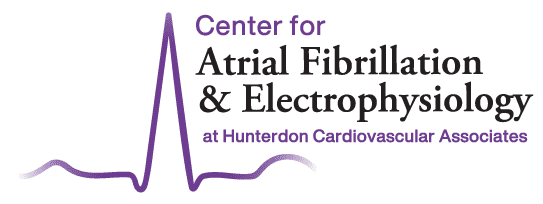The Center for Atrial Fibrillation and Electrophysiology at HCA’s innovative practice and its team are dedicated to treating disorders of the heart’s electrical system, working with patients to determine the best treatment options for their unique needs. We offer specialty atrial fibrillation (AFib) management along with treatment and management options for many other types of arrhythmias. We customize our AFib management plans to each individual patient, offering a unique personal treatment experience through the continuum of care.
Arrhythmia Treatment Options
Ablation is a medical procedure that offers the best chance at maintaining a normal heart rhythm for patients with AFib. Thermal energy, either heat (radiofrequency ablation) or cold (cryoablation) is applied to the area of the heart responsible for initiating or maintaining AFib. Cardiac ablation is most effective for people with an early form of the condition (paroxysmal AFib), but may still provide benefit for those with more advanced (persistent) AFib. This is especially true for those patients who want to take fewer long-term medications.
While under anesthesia, pads are placed on the chest to deliver an electric current that resets your heart rhythm. Some people with newly diagnosed AFib may have the option to undergo pharmacologic cardioversion, in which a medication is used to restore the normal heart rhythm.
This small, battery-powered device placed under the skin monitors your heart rate. Thin wires connect the implanted ICD to your heart. When an abnormal heart rhythm occurs, the ICD delivers an electric shock, which restores a normal heartbeat. ICDs are successful in preventing sudden death in patients with certain arrhythmias.
Certain medications can be used to help treat different types of arrhythmias. Our expert team will help you understand your medications and answer all of your questions. We have an on-site pharmacist (PharmD) available to help patients and caregivers review, manage and fill all medications and help prepare for any surgery or procedure.
Pacemakers are electronic devices that prevent the heartbeat from becoming too slow. Some people with AFib have periods of slow heart rates for which a pacemaker is needed. Ablation can be used in conjunction with pacemaker implantation in some people with AFib that does not respond to either treatment alone.
This permanent device is implanted in a one-time procedure into your heart to close off the part of your heart that allows blood clots to escape. The WATCHMAN reduces the risk of stroke.

Diagnostic Services
Echocardiogram
An echocardiogram, or echo, is a non-invasive ultrasound procedure that shows the anatomical structures of the heart.
Electrocardiogram
(ECG or EKG)
An electrocardiogram is a painless, noninvasive test performed in a doctor’s office or hospital to help diagnose an abnormal heart rhythm or other heart health problem.
Stress test
An exercise stress test is a non-invasive treadmill test that is used to assess how well the heart responds to extra demand. Medication-induced stress tests are also used.
Holter monitor
A Holter monitor is portable and continuously records the heart’s electrical activity during daily activities during a 24-hour or 48-hour period of time to identify abnormal heart rhythms.
Cardiac event monitor
A cardiac event monitor is a non-invasive, portable method for diagnosing a cardiac arrhythmia by recording a patient’s heart rate and rhythm during a period of time
Contact The Center for Atrial Fibrillation and Electrophysiology at HCA today to make an appointment to discuss your personalized diagnosis and treatment options with one of our specialists. Our team approach to AFib and other arrhythmias provides the resources you need to take control of your heart health.

![shutterstock_1383590327-(1)-2[Converted] Cardiac Ablation](https://hunterdonafibcenter-dev.10web.site/wp-content/uploads/2021/06/shutterstock_1383590327-1-2Converted-130x130.png)
![shutterstock_1053933101-2[Converted] Electrical Cardioversion](https://hunterdonafibcenter-dev.10web.site/wp-content/uploads/2021/06/shutterstock_1053933101-2Converted-130x130.png)
![shutterstock_1127044556-2[Converted] Implantable Cardiac Defibrillator (ICD)](https://hunterdonafibcenter-dev.10web.site/wp-content/uploads/2021/06/shutterstock_1127044556-2Converted-130x130.png)
![shutterstock_1304836714-2[Converted] Medication Management](https://hunterdonafibcenter-dev.10web.site/wp-content/uploads/2021/06/shutterstock_1304836714-2Converted-130x130.png)
![shutterstock_390154813-2[Converted] Pacemaker Implantation](https://hunterdonafibcenter-dev.10web.site/wp-content/uploads/2021/06/shutterstock_390154813-2Converted-130x130.png)
![shutterstock_1706747134-(1)-2[Converted] WATCHMAN Implantation](https://hunterdonafibcenter-dev.10web.site/wp-content/uploads/2021/06/shutterstock_1706747134-1-2Converted-130x130.png)